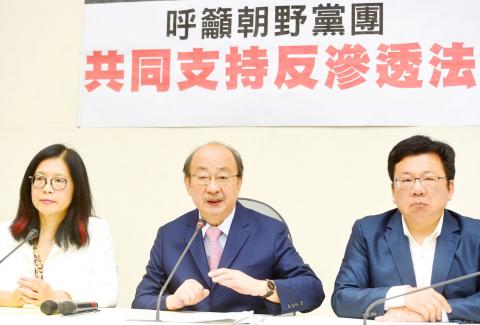The Democratic Progressive Party (DPP) caucus unveiled an anti-infiltration bill yesterday, proposing that illegal disruption of social order or assemblies under the command or request of “infiltration sources” should be subject to a maximum penalty of seven years in prison and a fine of NT$5 million (US$163,897).
The draft is needed to improve the nation’s legal infrastructure against increasing anti-democratic threats by hostile external forces, the DPP caucus said.
These forces have not backed down in their attempts to annex Taiwan, but have been intensifying the means by which they intend to meddle in elections and rattle social order, it said.

Photo: Chien Jung-fong, Taipei Times
This poses a serious threat to the nation’s sovereignty and democracy, it said.
“Infiltration sources” are defined in the bill as organizations or institutions affiliated with the government, political parties or other political groups of a foreign hostile force, and individuals dispatched by such entities.
A hostile force is defined as a country or group at war with or in a military standoff with Taiwan that upholds the idea of jeopardizing the nation’s sovereignty by non-peaceful means.
The 12-article draft prohibits anyone from making political donations, influencing elections, proposing the recall of government officials or launching public referendums at the instruction or with the financial support of an infiltration source.
It also prohibits lobbying and using illegal means to disrupt social order or jeopardize a public assembly at the instruction or with the financial support of a source of infiltration.
The caucus said it has been working on the bill for some time and that it has nothing to do with claims by self-proclaimed Chinese spy William Wang Liqiang (王立強) that he had been tasked with infiltrating Taiwan and interfering in elections.
“It is the shared duty of the ruling and opposition parties to maintain national security,” DPP caucus whip Ker Chien-ming (柯建銘) said, calling on the Chinese Nationalist Party (KMT) to support the proposal.
Hopefully, it could be passed before the current legislative session ends at the end of next month, Ker said.

A preclearance service to facilitate entry for people traveling to select airports in Japan would be available from Thursday next week to Feb. 25 at Taiwan Taoyuan International Airport, Taoyuan International Airport Corp (TIAC) said on Tuesday. The service was first made available to Taiwanese travelers throughout the winter vacation of 2024 and during the Lunar New Year holiday. In addition to flights to the Japanese cities of Hakodate, Asahikawa, Akita, Sendai, Niigata, Okayama, Takamatsu, Kumamoto and Kagoshima, the service would be available to travelers to Kobe and Oita. The service can be accessed by passengers of 15 flight routes operated by

MORE FALL: An investigation into one of Xi’s key cronies, part of a broader ‘anti-corruption’ drive, indicates that he might have a deep distrust in the military, an expert said China’s latest military purge underscores systemic risks in its shift from collective leadership to sole rule under Chinese President Xi Jinping (習近平), and could disrupt its chain of command and military capabilities, a national security official said yesterday. If decisionmaking within the Chinese Communist Party has become “irrational” under one-man rule, the Taiwan Strait and the regional situation must be approached with extreme caution, given unforeseen risks, they added. The anonymous official made the remarks as China’s Central Military Commission Vice Chairman Zhang Youxia (張又俠) and Joint Staff Department Chief of Staff Liu Zhenli (劉振立) were reportedly being investigated for suspected “serious

ENHANCING EFFICIENCY: The apron can accommodate 16 airplanes overnight at Taoyuan airport while work on the third runway continues, the transport minister said A new temporary overnight parking apron at Taiwan Taoyuan International Airport is to start operating on Friday next week to boost operational efficiency while the third runway is being constructed, the Ministry of Transportation and Communications said yesterday. The apron — one of the crucial projects in the construction of the third runway — can accommodate 16 aircraft overnight at the nation’s largest international airport, Minister of Transportation and Communications Chen Shih-kai (陳世凱) told reporters while inspecting the new facility yesterday morning. Aside from providing the airport operator with greater flexibility in aircraft parking during the third runway construction,

Taiwanese and US defense groups are collaborating to introduce deployable, semi-autonomous manufacturing systems for drones and components in a boost to the nation’s supply chain resilience. Taiwan’s G-Tech Optroelectronics Corp subsidiary GTOC and the US’ Aerkomm Inc on Friday announced an agreement with fellow US-based Firestorm Lab to adopt the latter’s xCell, a technology featuring 3D printers fitted in 6.1m container units. The systems enable aerial platforms and parts to be produced in high volumes from dispersed nodes capable of rapid redeployment, to minimize the risk of enemy strikes and to meet field requirements, they said. Firestorm chief technology officer Ian Muceus said